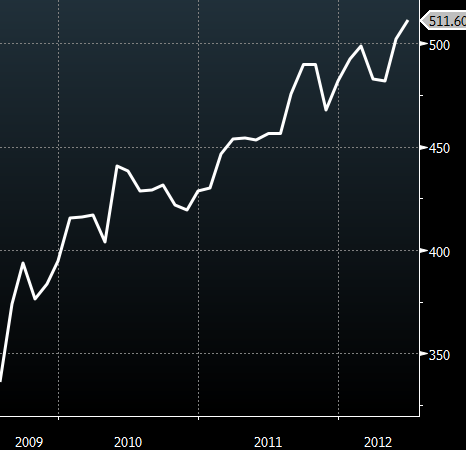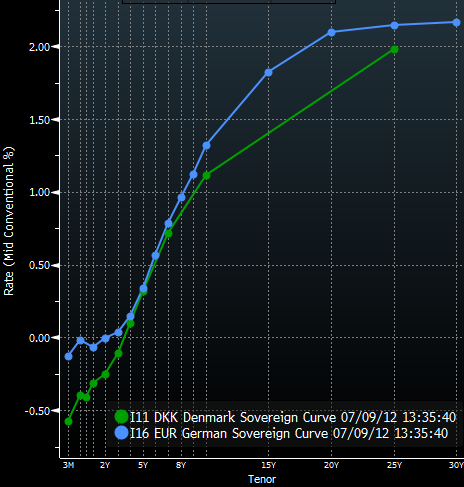As eurozone depositors look for safer places to put their money, Denmark has become one of the "destinations." It's not as popular as Switzerland but good enough to attract some sizable flows from euros into Danish kroner (DKK). With DKK pegged to the euro, the central bank has to buy euros to maintain the peg. And that's exactly what they have been forced to do for some time, as seen from growth of the foreign reserve account balances.
Defending the peg is forcing the central bank to flood the market with DKK (which they try to sterilize), all while building a large euro position. Allowing DKK to appreciate on the other hand will hurt the economy. Not a great outcome. Instead Denmark wants the eurozone's citizens to keep their euros out.
A few days ago the ECB set the deposit rate to zero, squeezing cash holders in the eurozone to look for other places to keep cash. Denmark's central bank, Nationalbank, had to do one better to keep these people out. Nationalbank set the deposit rate to negative 0.2. Denmark's banks will be losing money on deposits they take in (unless they charge rather than pay interest), which should keep these banks from taking large amounts of DKK (converted from euros) from eurozone depositors.
The Copenhagen Post: Banks will now have to pay to have their money in the central bank, Nationalbanken, after interest rates last week dropped into the negative for the first time ever.
Interest on deposits in the Nationalbank now lies at -0.2 percent while lending rates were cut to 0.2 percent.
The krone has been under increasingly intense pressure from investors that started to purchase the currency that is seen as a safe haven compared to the euro.
As a result, the kroner risked strengthening too much against the euro, which placed pressure on the tight peg that Nationalbanken tries to keep with the common currency.
Speaking to finanical daily Børsen, Sydbank’s chief economist Jacob Graven said that the decision to reduce the interest rates was made to defend the Danish economy.
“Nationalbanken is reducing the interest in order to make it a little less attractive to investors to invest in Danish kroner compared to the euro,” Graven said.
But if banks won't take euro-citizens' money, what about buying Denmark's short-term government paper. It can't be worse than Germany's negative rates, can it?
Actually Denmark's government rates are much worse. Maturities below 5 years now all have negative yields. 
Denmark is making it increasingly expensive for those who want to convert euros into DKK. But obviously some are willing to pay just to avoid holding euros. In some situations it may already be cheaper to hold physical DKK notes in a safe deposit box than in a bank account, which is apparently what many Europeans are already doing.
- English (UK)
- English (India)
- English (Canada)
- English (Australia)
- English (South Africa)
- English (Philippines)
- English (Nigeria)
- Deutsch
- Español (España)
- Español (México)
- Français
- Italiano
- Nederlands
- Português (Portugal)
- Polski
- Português (Brasil)
- Русский
- Türkçe
- العربية
- Ελληνικά
- Svenska
- Suomi
- עברית
- 日本語
- 한국어
- 简体中文
- 繁體中文
- Bahasa Indonesia
- Bahasa Melayu
- ไทย
- Tiếng Việt
- हिंदी
Denmark To Eurozone: Keep Your Darn Euros Out
Published 07/10/2012, 04:25 AM
Updated 07/09/2023, 06:31 AM
Denmark To Eurozone: Keep Your Darn Euros Out
3rd party Ad. Not an offer or recommendation by Investing.com. See disclosure here or
remove ads
.
Latest comments
Install Our App
Risk Disclosure: Trading in financial instruments and/or cryptocurrencies involves high risks including the risk of losing some, or all, of your investment amount, and may not be suitable for all investors. Prices of cryptocurrencies are extremely volatile and may be affected by external factors such as financial, regulatory or political events. Trading on margin increases the financial risks.
Before deciding to trade in financial instrument or cryptocurrencies you should be fully informed of the risks and costs associated with trading the financial markets, carefully consider your investment objectives, level of experience, and risk appetite, and seek professional advice where needed.
Fusion Media would like to remind you that the data contained in this website is not necessarily real-time nor accurate. The data and prices on the website are not necessarily provided by any market or exchange, but may be provided by market makers, and so prices may not be accurate and may differ from the actual price at any given market, meaning prices are indicative and not appropriate for trading purposes. Fusion Media and any provider of the data contained in this website will not accept liability for any loss or damage as a result of your trading, or your reliance on the information contained within this website.
It is prohibited to use, store, reproduce, display, modify, transmit or distribute the data contained in this website without the explicit prior written permission of Fusion Media and/or the data provider. All intellectual property rights are reserved by the providers and/or the exchange providing the data contained in this website.
Fusion Media may be compensated by the advertisers that appear on the website, based on your interaction with the advertisements or advertisers.
Before deciding to trade in financial instrument or cryptocurrencies you should be fully informed of the risks and costs associated with trading the financial markets, carefully consider your investment objectives, level of experience, and risk appetite, and seek professional advice where needed.
Fusion Media would like to remind you that the data contained in this website is not necessarily real-time nor accurate. The data and prices on the website are not necessarily provided by any market or exchange, but may be provided by market makers, and so prices may not be accurate and may differ from the actual price at any given market, meaning prices are indicative and not appropriate for trading purposes. Fusion Media and any provider of the data contained in this website will not accept liability for any loss or damage as a result of your trading, or your reliance on the information contained within this website.
It is prohibited to use, store, reproduce, display, modify, transmit or distribute the data contained in this website without the explicit prior written permission of Fusion Media and/or the data provider. All intellectual property rights are reserved by the providers and/or the exchange providing the data contained in this website.
Fusion Media may be compensated by the advertisers that appear on the website, based on your interaction with the advertisements or advertisers.
© 2007-2024 - Fusion Media Limited. All Rights Reserved.
